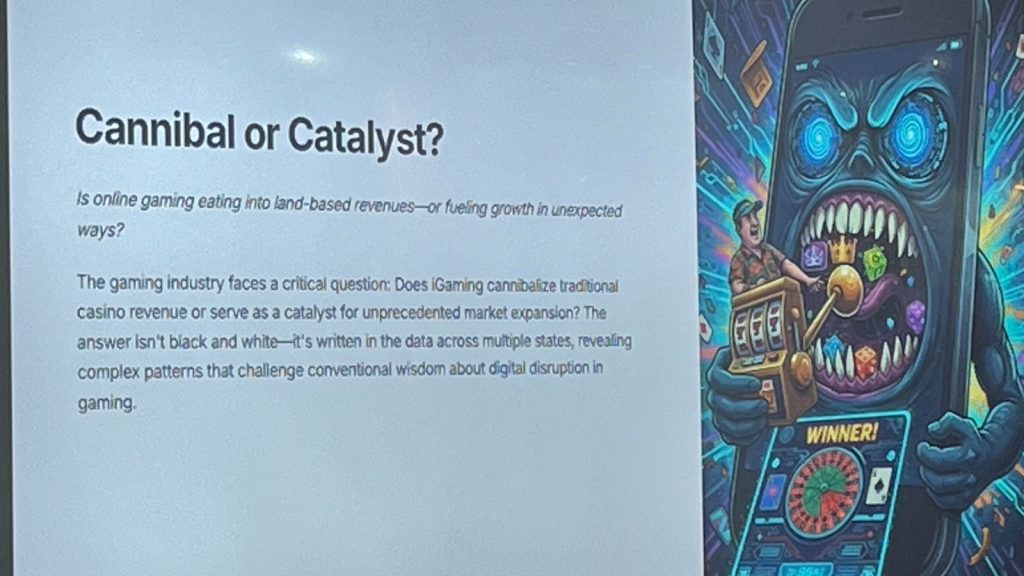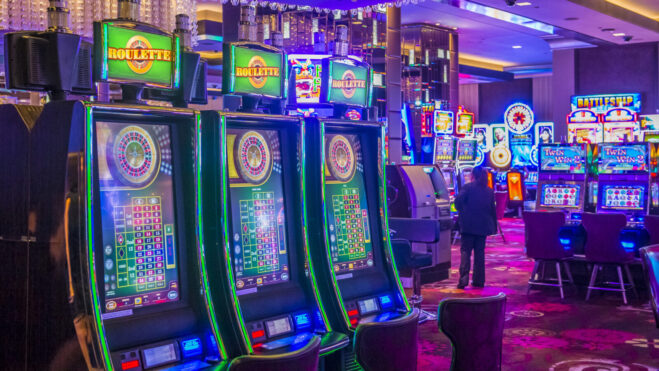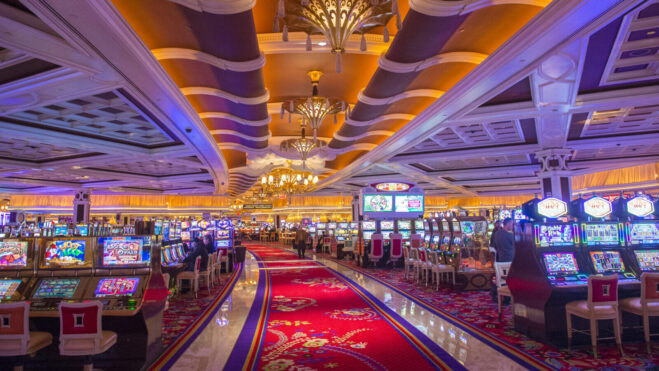G2E: Is iGaming A Cannibal Or Catalyst? Different Experiences Call For Different Approaches
Operators still need to perfect cross-marketing for online, retail operations
4 min

Global Gaming Expo (G2E) 2025 organizers touted a rollicking debate at a Wednesday panel called “iGaming: Cannibal or Catalyst.”
“[T]his session promises sparks, insights, and maybe a few surprises,” said the conference program, dubbing the brief session a “rapid-fire face-off” between dueling experts in iGaming and land-based gaming.
Before it started, a screen by the stage — which was situated amidst the exhibit hall, not the typical quiet conference rooms — displayed the description of the panel alongside a dramatic illustration of a demonic-looking mobile phone devouring a slot machine.
But the drama was short lived as moderator Seth Schorr, the CEO of the casino management company Fifth Street Gaming, telegraphed the consensus of the panel in his introduction when he observed that this is hardly the first time brick-and-mortar casinos have wondered whether a new form of gaming would undercut their operations.
“This is a question we’ve asked many times over the years as we’ve seen potentially competitive experiences to the traditional land-based casino business,” he said over the din of the exhibit hall. “We discussed it when we saw the riverboats, when we saw native casinos, and most recently with iGaming.”
Since it’s clear the first two examples haven’t exactly cannibalized the “traditional land-based casinos” Schorr referenced, it was pretty clear from the outset where the conversation was headed.
Online casino complementary
Panelist Greg Carlin, co-founder and managing member of the casino development company G2 Gaming, who was tasked with serving as the brick-and-mortar expert on the panel despite also having extensive experience in iGaming, opened the discussion by presenting line graphs of gaming revenue for three states where both land-based operators and iGaming are legal: Pennsylvania, Michigan, and New Jersey.
Slides for each state showed land-based revenue remaining stable as iGaming revenue rose over the years. The message was obvious: iGaming doesn’t displace land-based operations.

“Each one is a little bit different for different reasons,” Carlin said of the states, “but in general, if you look at the numbers, what you see is that the land-based casinos generally stayed flat, maybe grew a little bit, and whereas the online gaming really taking off.
“One of the interesting observations on the slides, if you look at the Pennsylvania slide and the New Jersey slide, the online revenues really ramped up in 2020 and the reason for that is COVID. If you remember back in March of 2020, bricks-and-mortar casinos across the country closed down. My former company, we had two casinos in Pennsylvania, one in Philadelphia, one in Pittsburgh, and we had just launched our online business in maybe late 2019 or early 2020. And when the casinos shut down, we were able to take our databases of bricks-and-mortar players, they were all home with nothing to do because of COVID, and we really ramped up a campaign to try to educate them about playing online.”
Give people a reason to visit
Carlin’s experience with Rush Street Gaming and its sister company Rush Street Interactive, which offer retail and online options, illustrated what the other panelist, Todd Haushalter, chief product officer of the iGaming company Evolution, offered as his opening sentiment: When you put an online casino in everyone’s pocket, “people don’t stop that much going to their local casinos.”
Rather, he said, online gaming just adds “a bunch more” gross gaming revenue.
“If you’re having a brainstorming session about what are we going to do about online gaming,” Haushalter said, “remove ‘online gaming’ from the discussion and say, ‘What are we going to do with this new casino opening up next door?’
“What are all the things you would do? You might bring back discounted buffet with crab legs, or you might think about your entertainment program. Or you might try to make it easier to park or you might not charge for parking. Or you’re just going to try to remove as much friction as possible because it’s not a casino next door. It’s a casino in your pocket,” he said, noting that about 75% of all online gaming happens on mobile phones.
Haushalter’s point was that land-based casinos have nothing to fear from iGaming so long as they “give people a reason to get in their car and come to your casino.”
“But if it’s a box with a collection of slot machines in there and it’s smokey, then you’re only offering slots and you’re going to quickly get overrun by a superior online product with better RTP [return to player], more variety, probably better cash-back programs,” he said. “It’s going to be a problem.”
Marketing omnichannel a challenge
Carlin immediately agreed, dashing any lingering hope for a contentious debate.
“I also think too one of the big topics that people have been discussing since online legalized in New Jersey is the concept of omnichannel,” Carlin said. “They’re really different kinds of experiences. Going to a casino is different than playing on your phone at home or wherever. Maybe they want to go to casino for one reason, maybe they want to play on their phone for one reason. How are companies addressing omnichannel? It’s interesting to me because I don’t think any one company has nailed it exactly right. It’s very complicated to pull it off.
“If you look at the retail space, Amazon, for example, got into retail stores. Some of the retail concepts have done a better job with omnichannel than casinos have. But some casinos are starting to catch up. I think Caesars has figured it out a little bit. Even MGM. I’m staying at the Bellagio and I was playing a little blackjack the other night, and I noticed on the blackjack table they had ‘BetMGM’ on the blackjack table. That’s their online brand. So, they’re starting to promote their online in the casino, and I think that makes a lot of sense.”
The panel concluded with the overall message that iGaming doesn’t have to cannibalize brick-and-mortar casinos, it can augment them, if operators are thoughtful and employees embrace an omnichannel approach.
“It’s not one or the other,” read the panel’s final slide. “Online gaming can be both catalyst and cannibal — driving market expansion while simultaneously creating competitive pressure. The key is understanding market conditions, player density, and competitive dynamics to predict which effect will dominate in specific jurisdictions.”





